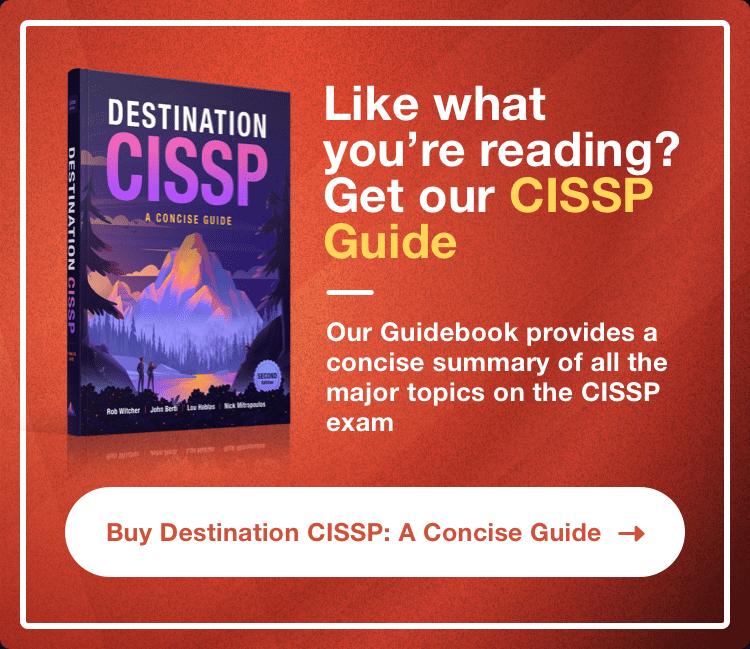The CISSP certification holds a prestigious position as one of the cybersecurity industry's most sought-after and respected qualifications. Yet, many aspiring professionals find their journey toward achieving this certification obscured by a fog of myths and misconceptions.
In this article, we're going to dismantle these myths, providing you with accurate insights and encouraging your journey toward CISSP certification. Whether you're contemplating taking your first step or are midway through your preparation, let's debunk these common CISSP myths together, clearing the path for your success in the cybersecurity domain.
CISSP Myth 1: CISSP Certification Demands Pure Technical Expertise
Contrary to popular belief, CISSP certification doesn't demand pure technical expertise. It's a common myth that sidelines many aspiring candidates who fear they lack the necessary technical background.
In reality, CISSP covers a wide range of information security domains, not just the technical aspects. This includes governance, risk management, compliance, security engineering, and cryptography. The certification is designed for professionals with diverse backgrounds, emphasizing a holistic view of cybersecurity that values managerial and policy understanding as much as technical knowledge.
Thus, success in CISSP hinges on a balanced blend of skills, proving that the certification is accessible to a wide array of professionals, not just those with a deep technical focus.
CISSP Myth 2: Five Years is the Mandatory Starting Point for CISSP
The belief that five years of direct security work experience is required to consider CISSP certification deters many early-career professionals. In truth, the CISSP credential does prefer five years of experience in its domains, but there's a flexible pathway for those still gathering this experience.
Enter the Associate of ISC2 status.
This allows individuals to pass the CISSP exam and earn the Associate of ISC2 designation, granting them time to accumulate the necessary experience post-examination. This approach not only broadens access to the certification but also encourages a commitment to the cybersecurity field from the outset of one's career, making the CISSP journey more inclusive and achievable for aspiring professionals at various stages.
CISSP Myth 3: Enrolling in Any CISSP Course Guarantees Certification
A prevalent myth is that simply enrolling in any CISSP course will guarantee certification. While these courses are often comprehensive and well-structured, they may not be the perfect fit for everyone's unique learning style. The reality is that there's no inherent issue with the quality of these courses; the challenge lies in finding a course that aligns with your personal learning preferences.
For instance, a one-size-fits-all approach rarely accommodates every learner effectively. The key is to seek out a CISSP course that offers dynamic adjustment to your existing knowledge, focusing on areas that require the most attention. Such tailored learning ensures that you're not just going through the motions but are engaging deeply with the material where you need it most, significantly enhancing your chances of success on the certification exam.
CISSP Myth 4: Getting CISSP-Certified is Expensive
It's true that achieving CISSP certification involves costs beyond the exam fee, including courses and study materials, which can add up. However, viewing these expenses merely as costs misses the broader picture. Instead, consider them an investment in your future.
The benefits of obtaining CISSP certification extend far beyond recognition. They encompass potential salary increases and access to career opportunities that might be elusive to those without this prestigious certification.
The upfront investment in CISSP certification can lead to substantial long-term returns, making it a strategic move for anyone serious about advancing their career in cybersecurity. This perspective shifts the focus from the immediate financial outlay to the expansive professional advantages and opportunities that CISSP certification brings.
CISSP Myth 5: CISSP Exam is Very Difficult
Many are intimidated by the CISSP exam, fearing its reputation as being exceedingly difficult. While it's true the exam covers a broad range of topics, it's often described as being "a mile wide and an inch deep." This means that, rather than requiring deep technical proficiency in a narrow area, the CISSP exam tests a wide breadth of knowledge across the cybersecurity spectrum but not to an extreme depth in any single domain.
Understanding this can shift your study approach from mastering every minute detail to developing a comprehensive overview of all areas. Proper preparation and a strategic study plan focusing on understanding each domain's core concepts and principles can demystify the exam's challenges.
Yes, the CISSP exam is demanding, but it's also entirely within reach with the right preparation, making it a formidable but achievable goal.
FAQs
People might fail the CISSP exam due to underestimating its coverage, lack of preparation in one or more domains, insufficient practical experience, or poor time management during the exam. The CISSP covers a wide range of topics, making thorough preparation crucial.
Yes, the CISSP exam is considered challenging due to its broad scope covering various domains of cybersecurity, but with thorough preparation and understanding of the concepts, it is achievable.
Absolutely, the CISSP certification remains highly valuable and relevant in the field of information security. It is recognized worldwide and demonstrates a high level of knowledge and competence in information security. The CISSP is recognized by many as the gold standard in security certifications and certainly today, represents more value than ever before.
Jumpstart Your Cybersecurity Career with CISSP Certification
While the journey to achieving CISSP certification may seem daunting due to widespread myths, understanding the reality behind these misconceptions reveals a challenging yet achievable path. With the right preparation and mindset, the CISSP certification is an invaluable investment in your future, opening doors to advanced career opportunities, potential salary increases, and recognition in the cybersecurity field.
As you set out on this path, consider how tailored, flexible training options can make all the difference. That's where Destination Certification CISSP MasterClass comes in. Our approach to CISSP training is designed to meet you where you are, adapting to your unique learning style and focusing on areas where you need support the most.
Rob Witcher
Rob is the driving force behind the success of the Destination Certification CISSP program, leveraging over 15 years of security, privacy, and cloud assurance expertise. As a seasoned leader, he has guided numerous companies through high-profile security breaches and managed the development of multi-year security strategies. With a passion for education, Rob has delivered hundreds of globally acclaimed CCSP, CISSP, and ISACA classes, combining entertaining delivery with profound insights for exam success. You can reach out to Rob on LinkedIn.



